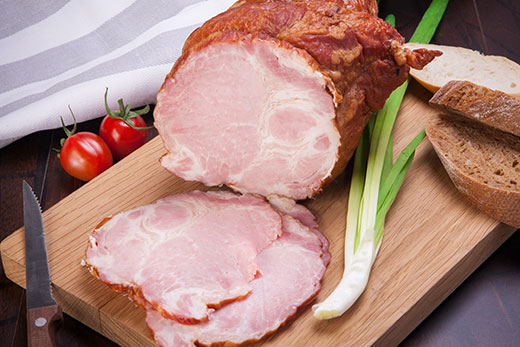
Fresh, or cook-before-eating, ham must be cooked to an internal temperature of 145 degrees Fahrenheit before serving.
K-State expert shares Easter food safety tips
Know how to cook and store foods to keep yourself healthy
April 3, 2020
MANHATTAN, Kan. – There is, perhaps, nothing that spoils the party more than an unwanted guest.
In the case of holiday gatherings, foodborne illness is one of those that is not welcome at the dinner table. Kansas State University food safety specialist Karen Blakeslee says that keeping you and your family healthy this Easter is a matter of handling foods safely in the kitchen…starting with what is often the centerpiece of the meal.
“Be sure to read the label to know what type of ham you are purchasing, either fresh or ready-to-eat,” said Blakeslee, coordinator of the university’s Rapid Response Center, a resource for food safety information. “Fresh ham labels will detail cooking instructions, and the label may state ‘cook thoroughly.’”
She added that ready-to-eat ham can be served out of the package or reheated in the oven at 325 degrees F until the internal temperature reaches 140 F.
Fresh, or cook-before-eating, hams must be cooked to an internal temperature of 145 F at an oven temperature of 325 F. Blakeslee said a timetable for cooking ham is available from the U.S. Department of Agriculture.
For a fun twist on the holiday ham, Blakeslee suggested cooking outside on the grill, if weather permits. “Ham, lamb and other meats that are grilled can add extra flavor to your Easter meals,” she said.
Ham should be eaten or stored within two hours after heating.
Blakeslee said popular cold foods like salads and egg dishes should be kept cold, below 40 F, until ready to serve. “Mayonnaise in salads is very acidic and likely not a foodborne illness issue,” she said. “But it’s the other ingredients, such as potatoes, eggs, chicken or pasta that can allow bacteria to thrive if handled poorly or temperature abused.”
With the novel coronavirus, COVID-19, in the news, Blakeslee said there is no scientific evidence that the virus can be transferred on food.
“There are no reports at this time of human illness that suggest COVID-19 can be transmitted by food or food packaging,” she said. Regardless, “please use safe food handling practices; clean, cook, separate and chill to keep your food and yourself safe. And follow the guidelines in your area for recommendations on social gatherings.”

